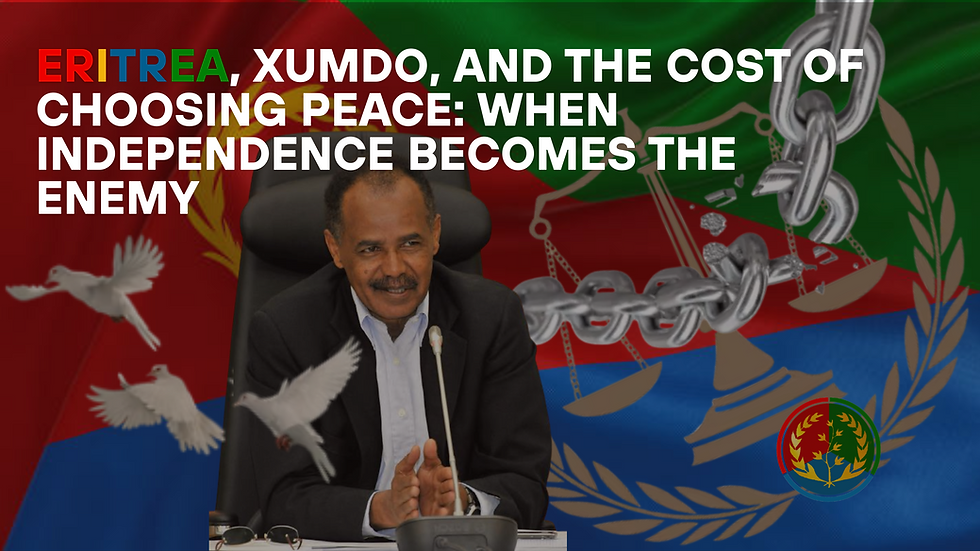UAE and Israel’s Involvement in the Horn of Africa: A Tool for Western Dominance
- Nakfa Eritrea
- Nov 30, 2024
- 3 min read
The Horn of Africa has become a critical battleground for influence, with the UAE and Israel acting as key players in advancing Western geopolitical objectives. Their actions in the region align with broader strategies aimed at maintaining a Western foothold in one of the world’s most strategically significant areas while countering the influence of emerging powers like BRICS nations and China.
Strategic Goals of UAE and Israel in the Horn of Africa
Control of Maritime Routes and the Red Sea
The Horn of Africa’s proximity to the Red Sea and Gulf of Aden makes it a strategic chokepoint for global trade, especially oil shipments. Israel and the UAE’s presence in Somaliland and other parts of the Horn allow them to monitor and control these critical waterways.
By establishing ports, military bases, and intelligence hubs, these nations serve as extensions of Western powers to secure vital trade routes against rising Chinese influence.
Countering BRICS and China
China’s Belt and Road Initiative (BRI) has significantly increased Beijing’s footprint in the region through investments in infrastructure like Djibouti’s port and railways connecting Ethiopia to the coast.
The UAE and Israel act as intermediaries to push back against China’s growing influence, ensuring the Horn of Africa remains within a Western-dominated economic and military orbit. For instance, by partnering with Somaliland, they create alternative trade and logistical hubs that sideline China-backed projects.
Regional Military Expansion
The UAE has built a military base in Berbera, Somaliland, under the guise of supporting local development. This base complements Israeli intelligence operations and broader Western military objectives, such as countering Iranian influence in the region.
Israel’s involvement, supported by U.S. and European allies, focuses on securing the Red Sea against perceived threats while maintaining access for Western military and commercial interests.
Implications for the Horn of Africa
Perpetuation of Instability
Western-backed interventions often prioritize strategic dominance over the welfare of local populations. The UAE and Israel’s involvement in Somaliland and other parts of the Horn exacerbate existing tensions, including disputes over territorial sovereignty, as seen with Somalia’s claims over Somaliland.
Instead of fostering regional unity, their actions deepen divisions, making it easier for Western powers to exploit fractured governance structures.
Economic Exploitation
While UAE and Israeli investments are framed as development projects, they often result in the extraction of resources and wealth for external benefit, leaving local populations with limited gains. For example, port developments primarily serve international trade and military logistics rather than boosting local economies.
Blocking Alternative Power Structures
BRICS nations and China have offered alternative models of cooperation, including investments without stringent political strings. The UAE-Israel presence aims to block these options, ensuring the region remains dependent on Western-controlled systems like the IMF and World Bank.
Broader Geopolitical Context
US and Western Interests
The UAE and Israel’s actions align with broader Western goals of maintaining dominance in the global south. By controlling strategic regions like the Horn of Africa, Western powers aim to secure trade routes, natural resources, and military advantage.
Their presence also serves as a buffer against the rising influence of multipolar initiatives like BRICS, which challenge the dollar-based global economy.
Iran and Regional Rivalries
Countering Iran’s influence is another key driver. The UAE and Israel, both antagonistic to Iran, have used their foothold in the Horn of Africa to monitor and counter Iranian activities, including alleged arms shipments to proxies like the Houthis in Yemen.
These actions often escalate tensions, drawing the Horn of Africa into broader Middle Eastern conflicts.
Conclusion: Western Puppetry in the Horn of Africa
The UAE and Israel’s involvement in the Horn of Africa is a clear extension of Western powers’ strategy to maintain dominance over a vital geopolitical region. By leveraging their partnerships with local governments like Somaliland, they ensure the Red Sea and Horn of Africa remain closed to alternative power structures like BRICS and China. However, these interventions come at the cost of regional stability, sovereignty, and long-term development for the people of the Horn.
As the region grapples with these dynamics, it is essential for local leaders and global allies to resist these neo-imperial tactics and foster partnerships that prioritize genuine development and sovereignty.
.png)



Comments